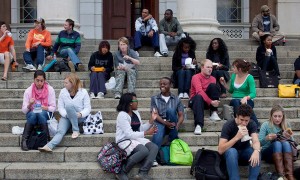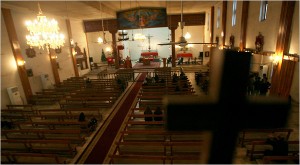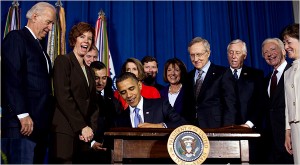from the New York Times, by: Celia W. Dugger
 CAPE TOWN — The University of Cape Town was once a citadel of white privilege on the majestic slopes of Devil’s Peak. At the height of apartheid, it admitted few black or mixed-race students, and they were barred from campus dormitories, even forbidden to attend medical school postmortems on white corpses.
CAPE TOWN — The University of Cape Town was once a citadel of white privilege on the majestic slopes of Devil’s Peak. At the height of apartheid, it admitted few black or mixed-race students, and they were barred from campus dormitories, even forbidden to attend medical school postmortems on white corpses.
South Africa’s finest university is now resplendently multiracial. But it is also engaged in a searching debate about just how far affirmative action should go to heal the wounds of an oppressive history, echoing similar conflicts in the United States, where half a dozen states have banned the use of racial preferences in admissions to public universities.
“Are we here because we’re black or are we here because we’re intelligent?” asked Sam Mgobozi, 19, a middle-class black student who attended a first-rate high school in Durban and finds affirmative action offensive, even as he concedes that poor black applicants may still need it.
The University of Cape Town was supposed to have settled this debate last year when its professors — 70 percent of them white men — supported a policythat gave admissions preferences based on apartheid racial categories to black, mixed-race and Indian students.
Instead, unease with the current approach has spilled out over the past year in fierce exchanges on newspaper editorial pages and formal debating platforms. Sixteen years after the political ascent of the black majority, the university’s dilemma resonates across a society conflicted about how best to achieve racial redress, whether in corporate board rooms or classrooms.
Prof. Neville Alexander, a Marxist sociologist who was classified as mixed race under apartheid, has roused the campus debate with the charge that affirmative action betrays the ideals of nonracialism that so many fought and died for during the long struggle against apartheid. Professor Alexander, who spent a decade imprisoned on Robben Island with Nelson Mandela, insists that the University of Cape Town, which is public, must resist pressure from the government to use racial benchmarks in determining how well the university is performing. “The government under apartheid did the same and we told them to go to hell,” he said in one standing-room-only campus debate.
Affirmative action’s champion on campus is Max Price, the vice chancellor, who was himself detained as an anti-apartheid student activist in the mid-1970s. Dr. Price, who grew up as a child of white privilege, contends that preferences based on apartheid’s racial classifications provide a means to help those harmed by that system to gain critical educational opportunities.
The university has an openly stated policy of admitting blacks who have substantially lower test scores than whites, but whites still outnumber blacks almost two to one — 45 percent versus 25 percent — among the 20,500 South African students at the university. In South Africa, 79 percent of the population is black and only 9 percent is white.
And even with extensive programs of compensatory instruction on campus to help disadvantaged students, just over half of the black students graduated in five years in recent years, while four out of five whites completed their educations in that time, university statistics show. “We’re getting the best here and the best is struggling,” said a deputy vice chancellor, Crain Soudien.
The situation is even bleaker in higher education across the country. In engineering, law, the sciences and business management, only about a third or fewer of black students manage to get a degree in five years, researchers have found. The country’s efforts to produce black professionals remain crippled by failing public high schools in impoverished rural areas and black townships that the post-apartheid government has proved unable to fix.
Social class is another complicating factor. There are wide disparities in income between white and black South Africans, but also among blacks. The job market rewards graduates of top universities — black and white — while punishing the ill-educated, who are overwhelmingly black.
Students and professors here ask whether children of the emerging black middle and upper classes should continue to get the same break on admissions as impoverished black students. The university is developing nonracial measures of disadvantage — for example, whether applicants’ parents went to a university, or the quality of the high schools the students themselves attended.
But the university now only has enough staff to base its admissions decisions for most students on their scores on a national subject-based examination for high school seniors and their apartheid racial classifications.
Link to the article is here: http://www.nytimes.com/2010/11/23/world/africa/23safrica.html?pagewanted=1&ref=africa


 WASHINGTON — The military’s longstanding ban on service by gays and lesbians came to a historic and symbolic end on Wednesday, as
WASHINGTON — The military’s longstanding ban on service by gays and lesbians came to a historic and symbolic end on Wednesday, as